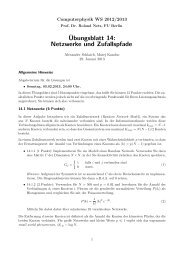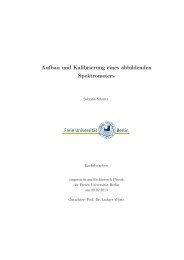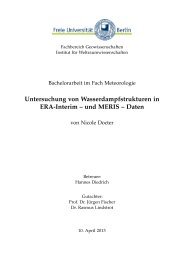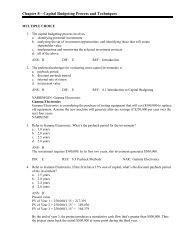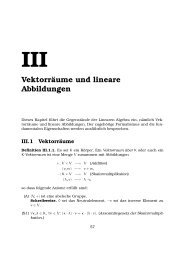Humanismus und Philosophie im Kalten Krieg Der ... - Userpage
Humanismus und Philosophie im Kalten Krieg Der ... - Userpage
Humanismus und Philosophie im Kalten Krieg Der ... - Userpage
Create successful ePaper yourself
Turn your PDF publications into a flip-book with our unique Google optimized e-Paper software.
<strong>Humanismus</strong> <strong>und</strong> <strong>Philosophie</strong> <strong>im</strong> <br />
<strong>Kalten</strong> <strong>Krieg</strong> <br />
<strong>Der</strong> französische Moment der <br />
<strong>Philosophie</strong>, I <br />
(8.1.2013) <br />
Frieder OBo Wolf <br />
FUB <br />
WiSe 2012-‐13
ParHkulare Momente der <br />
philosophischen Universalität <br />
“Philosophy is thus both a universal a<strong>im</strong> of reason <br />
and, s<strong>im</strong>ultaneously, one that manifests itself in <br />
completely specific moments. Let us take the <br />
example of two especially intense and well-‐known <br />
philosophical instances. <br />
First, that of classical Greek philosophy between <br />
Parmenides and Aristotle, from the 5th to the 3rd <br />
centuries BC: a highly invenHve, fo<strong>und</strong>aHonal <br />
moment, ulHmately quite short-‐lived. <br />
Second, that of German idealism between Kant and <br />
Hegel, via Fichte and Schelling: another excepHonal <br />
www.friederoBowolf.de
ParHkulare Momente der <br />
philosophischen Universalität, 2 <br />
philosophical moment, from the late 18th to the early <br />
19th centuries, intensely creaHve and condensed within <br />
an even shorter Hmespan. I propose to defend a further <br />
naHonal and historical thesis: there was-‐or there is, <br />
depending where I put myself-‐a French philosophical <br />
moment of the second half of the 20th century which, <br />
toute propor4on gardée, bears comparison to the <br />
examples of classical Greece and enlightenment <br />
Germany.” <br />
(Alain Badiou, The Adventure of French Philosophy, in: <br />
New Lea Review, II, 2005, Nr. 35, 67-‐77) <br />
www.friederoBowolf.de
Heroische Momente der <strong>Philosophie</strong> <br />
als TäHgkeit <br />
• Griechisch-‐römischer Moment (VorsokraHker -‐ Seneca) <br />
• SpätanHker Moment (PloHn -‐ Origines) <br />
• Arabischer Moment (Ibn Sina -‐ Ibn Khaldoun) <br />
• ScholasHscher Moment (Anselm von Canterbury – <br />
Wilhelm von Ockham) <br />
• HumanisHscher Moment (Petrarca – Machiavelli) <br />
• Moment der Auelärung (Descartes/Bacon – <br />
Encyclopédie/Adam Smith) <br />
• Deutscher Moment (Kant/Herder – Junghhegelianer – <br />
Husserl/Heidegger) <br />
www.friederoBowolf.de
<strong>Der</strong> französische Moment der <br />
<strong>Philosophie</strong> <br />
Sartre's fo<strong>und</strong>aHonal work, Being and Nothingness, <br />
appeared in 1943 and the last wriHngs of Deleuze, <br />
What is Philosophy?, date from the early 1990s. <br />
The moment of French philosophy develops <br />
between the two of them, and includes Bachelard, <br />
Merleau-‐Ponty, Lévi-‐Strauss, Althusser, Foucault, <br />
<strong>Der</strong>rida and Lacan as well as Sartre and Deleuze-and<br />
myself, maybe. <br />
(Alain Badiou, a.a.O.) <br />
www.friederoBowolf.de
1. Ursprünge [<strong>und</strong> Hintergr<strong>und</strong>] <br />
• First, origins: where does this moment come <br />
from, what were its antecedents, what was its <br />
birth? <br />
• In 1911, Bergson gave two celebrated lectures <br />
at Oxford, which appeared in his collecHon La <br />
pensée et le mouvement. In 1912, <br />
s<strong>im</strong>ultaneously, in other words, Brunschvicg <br />
published Les Étapes de la philosophie <br />
mathéma4que. <br />
www.friederoBowolf.de
1. Ursprünge …, Forts. 1 <br />
• In Bergson we find what might be called a philosophy <br />
of vital interiority, a thesis on the idenHty of being and <br />
becoming; a philosophy of life and change. This <br />
orientaHon will persist throughout the 20th century, <br />
up to and including Deleuze. <br />
• In Brunschvicg's work, we find a philosophy of the <br />
mathemaHcally based concept: the possibility of a <br />
philosophical formalism of thought and of the <br />
symbolic, which likewise conHnues throughout the <br />
century, most specifically in Lévi-‐Strauss, Althusser and <br />
Lacan. <br />
www.friederoBowolf.de
1. Ursprünge …, Forts. 2 <br />
• On one side, a philosophy of life; on the other, a <br />
philosophy of the concept. <br />
• At stake in any such discussion is the quesHon of the <br />
human subject, for it is here that the two orientaHons <br />
coincide. At once a living organism and a creator of <br />
concepts, the subject is interrogated both with regard <br />
to its interior, an<strong>im</strong>al, organic life, and in terms of its <br />
thought, its capacity for creaHvity and abstracHon. The <br />
relaHonship between body and idea, or life and <br />
concept, formulated aro<strong>und</strong> the quesHon of the <br />
subject, thus structures the whole development of <br />
20th-‐century French philosophy from the iniHal <br />
opposiHon between Bergson and Brunschvicg <br />
onwards. <br />
www.friederoBowolf.de
1. Ursprünge …, Forts. 3 <br />
• A first definiHon of the French philosophical moment <br />
would therefore be in terms of the conflict over the <br />
human subject, since the f<strong>und</strong>amental issue at stake in <br />
this conflict is that of the relaHonship between life and <br />
concept. <br />
• We could, of course, take the quest for origins further <br />
back and describe the division of French philosophy as <br />
a split over the Cartesian heritage. In one sense, the <br />
postwar philosophical moment can be read as an epic <br />
discussion about the ideas and significance of <br />
Descartes, as the philosophical inventor of the <br />
category of the subject. <br />
www.friederoBowolf.de
Hintergründe <br />
• EtaHsmus <strong>und</strong> Zentralismus in der französischen Kultur <br />
• Besondere Bedeutung der Bildung in der <br />
ElitenreprodukHon in Frankreich <br />
• Zentralität der <strong>Philosophie</strong> <strong>im</strong> französischen <br />
Bildungssystem <br />
• Die ‚Sonderentwicklung‘ der ‚sciences humaines‘ in <br />
Frankreich <br />
• Die realen Illusionen der Résistance <strong>und</strong> des ‚DriBen <br />
Weges‘: intellektueller Gegenpol zum NS-‐Faschismus <br />
<strong>und</strong> <strong>im</strong>aginäre AlternaHve zur BlockkonfrontaHon <br />
www.friederoBowolf.de
2. Philosophische OperaHonen [<strong>und</strong> <br />
Gehalt] <br />
• Next, what were the principal philosophical operaHons <br />
that it <strong>und</strong>ertook? <br />
• Vier OperaHonen: <br />
-‐ The first move is a German one, or rather, a French <br />
move upon German philosophers. <br />
All contemporary French philosophy is also, in reality, a <br />
discussion of the German heritage. Its formaHve <br />
moments include Kojève's seminars on Hegel, <br />
aBended by Lacan and also influenHal upon Lévi-‐Strauss, <br />
and the discovery of phenomenology in the 1930s and <br />
40s, through the works of Husserl and Heidegger. <br />
www.friederoBowolf.de
2. Philosophische OperaHonen [<strong>und</strong> <br />
Gehalt], 1. Forts. <br />
What was it that they sought? <br />
In a phrase: a new relaHon between concept and <br />
existence. Behind the many names this search <br />
adopted-‐deconstrucHon, existenHalism, <br />
hermeneuHcs-‐lies a common goal: that of <br />
transforming, or displacing, this relaHon. The <br />
existenHal transformaHon of thought, the relaHon <br />
of thought to its living subsoil, was of compelling <br />
interest for French thinkers grappling with this <br />
central issue of their own heritage. <br />
www.friederoBowolf.de
2. Philosophische OperaHonen [<strong>und</strong> <br />
Gehalt], 2. Forts. <br />
-‐ The second operaHon, no less <strong>im</strong>portant, concerns <br />
science. <br />
French philosophers sought to wrest science from the <br />
exclusive domain of the philosophy of knowledge by <br />
demonstraHng that, as a mode of producHve or creaHve <br />
acHvity, and not merely an object of reflecHon or <br />
cogniHon, it went far beyond the realm of knowledge. <br />
They interrogated science for models of invenHon and <br />
transformaHon that would inscribe it as a pracHce of <br />
creaHve thought, comparable to arHsHc acHvity, rather <br />
than as the organizaHon of revealed phenomena. <br />
www.friederoBowolf.de
2. Philosophische OperaHonen [<strong>und</strong> <br />
Gehalt], 3. Forts. <br />
-‐ “The third operaHon is a poliHcal one.” <br />
“they looked to poliHcs for a new relaHon between <br />
concept and acHon, in parHcular, collecHve acHon. <br />
This f<strong>und</strong>amental desire to engage philosophy with <br />
the poliHcal situaHon transforms the relaHon <br />
between concept and acHon” <br />
-‐ “The fourth operaHon has to do with the <br />
modernizaHon of philosophy, in a sense quite <br />
disHnct from the cant of successive government <br />
administraHons.” <br />
www.friederoBowolf.de
2. Philosophische OperaHonen [<strong>und</strong> <br />
Gehalt], 4. Forts. <br />
“French philosophers evinced a profo<strong>und</strong> <br />
aBracHon to modernity. They followed <br />
contemporary arHsHc, cultural and social <br />
developments very closely. There was a strong <br />
philosophical interest in non-‐figuraHve painHng, <br />
new music and theatre, detecHve novels, jazz <br />
and cinema, and a desire to bring philosophy to <br />
bear upon the most intense expressions of the <br />
modern world.” <br />
www.friederoBowolf.de
2. Philosophische OperaHonen [<strong>und</strong> <br />
Gehalt], 5. Forts. <br />
“In sum: the French philosophical moment <br />
encompassed a new appropriaHon of German <br />
thought, a vision of science as creaHvity, a <br />
radical poliHcal engagement and a search for <br />
new forms in art and life.” <br />
www.friederoBowolf.de
2. Philosophische OperaHonen [<strong>und</strong> <br />
Gehalt], 6. Forts. <br />
Die Frage nach dem philosophischen Gehalt -‐> <br />
Frage nach dem Einsatz, um den es dabei <strong>im</strong>mer <br />
wieder ging: ein neues Denken der Befreiung <br />
zeitgeb<strong>und</strong>en materialisierter Subjekte, aber <br />
wiederum in dezidiert philosophischer Form – kein <br />
Verlassen der <strong>Philosophie</strong> wie es Marx <strong>und</strong> Freud <br />
anHzipiert haBen <br />
(in Richtung Befreiung von Kapitalherrschaa –Marx <br />
– <strong>und</strong> in Richtung Überwindung der Neurose als <br />
Bedingung der Liebesfähigkeit – Freud). <br />
www.friederoBowolf.de
3. SHl <strong>und</strong> Verknüpfung mit der <br />
Literatur <br />
• “Third, the f<strong>und</strong>amental quesHon of these <br />
philosophers' link with literature, and the more <br />
general connecHon between philosophy and <br />
literature within this sequence.” <br />
“common aBempt to find a new posiHon, or <br />
disposiHon, for the concept: to displace the relaHon <br />
between the concept and its external environment <br />
by developing new relaHons to existence, to <br />
thought, to acHon, and to the movement of forms” <br />
www.friederoBowolf.de
3. SHl <strong>und</strong> Verknüpfung mit der <br />
Literatur, 1. Forts. <br />
• “this posed the issue of the form of <br />
philosophy itself: one could not displace the <br />
concept without invenHng new philosophical <br />
forms. It was thus necessary not just to create <br />
new concepts but to transform the language <br />
of philosophy. This prompted a singular <br />
alliance between philosophy and literature <br />
which has been one of the most striking <br />
characterisHcs of contemporary French <br />
philosophy.” <br />
www.friederoBowolf.de
3. SHl <strong>und</strong> Verknüpfung mit der <br />
Literatur, 2. Forts. <br />
„ The surrealists also played an <strong>im</strong>portant role. <br />
They too were eager to shake up relaHons <br />
regarding the producHon of forms, modernity, <br />
the arts; they wanted to invent new modes of <br />
life. If theirs was largely an aestheHc <br />
programme, it paved the way for the <br />
philosophical programme of the 1950s and 60s; <br />
both Lacan and Lévi-‐Strauss frequented <br />
surrealist circles, for example. <br />
www.friederoBowolf.de
3. SHl <strong>und</strong> Verknüpfung mit der <br />
Literatur, 3. Forts. <br />
“The specificity of this moment in French <br />
philosophy is to play upon several different <br />
registers in language, displacing the borders <br />
between philosophy and literature, between <br />
philosophy and drama. One could even say that <br />
one of the goals of French philosophy has been <br />
to construct a new space from which to write, <br />
one where literature and philosophy would be <br />
indisHnguishable; <br />
www.friederoBowolf.de
3. SHl <strong>und</strong> Verknüpfung mit der <br />
Literatur, 4. Forts. <br />
a domain which would be neither specialized <br />
philosophy, nor literature as such, but rather the <br />
home of a sort of wriHng in which it was no <br />
longer possible to disentangle philosophy from <br />
literature. A space, in other words, where there <br />
is no longer a formal differenHaHon between <br />
concept and life, for the invenHon of this wriHng <br />
ulHmately consists in giving a new life to the <br />
concept: a literary life.” <br />
www.friederoBowolf.de
3. SHl <strong>und</strong> Verknüpfung mit der <br />
Literatur, 3. Forts. <br />
This is a complex history, but if the surrealists <br />
were the first representaHves of a 20th-‐century <br />
convergence between aestheHc and <br />
philosophical projects in France, by the 1950s <br />
and 60s it was philosophy that was invenHng its <br />
own literary forms in an aBempt to find a direct <br />
expressive link between philosophical style and <br />
presentaHon, and the new posiHoning for the <br />
concept that it proposed.” <br />
www.friederoBowolf.de
4. <strong>Philosophie</strong> / Psychoanalyse <br />
[/ Marxismus] <br />
• “And finally, the constant discussion throughout <br />
this whole period between philosophy and <br />
psychoanalysis.” <br />
“At stake, finally, in this invenHon of a new wriHng, <br />
is the enunciaHon of the new subject; of the <br />
creaHon of this figure within philosophy, and the <br />
restructuring of the baBlefield aro<strong>und</strong> it. For this <br />
can no longer be the raHonal, conscious subject <br />
that comes down to us from Descartes; it cannot <br />
be, to use a more technical expression, the <br />
reflexive subject.” <br />
www.friederoBowolf.de
4. <strong>Philosophie</strong> / Psychoanalyse <br />
[/ Marxismus], 1. Fortsetzung <br />
• “If psychoanalysis has been an interlocutor, it <br />
is because the Freudian invenHon was also, in <br />
essence, a new proposiHon about the subject. <br />
For what Freud introduced with the idea of <br />
the unconscious was the noHon of a human <br />
subject that is greater than consciousness-which<br />
contains consciousness, but is not <br />
restricted to it; such is the f<strong>und</strong>amental <br />
significaHon of the word "unconscious".” <br />
www.friederoBowolf.de
4. <strong>Philosophie</strong> / Psychoanalyse <br />
[/ Marxismus], 2. Forts <br />
„ Three key texts may give us an idea of it.“ <br />
“The first, perhaps the clearest example of this <br />
complicity and compeHHon, comes from the <br />
beginning of Bachelard's work of 1938, La <br />
psychanalyse du feu. Bachelard proposes a new <br />
psychoanalysis gro<strong>und</strong>ed in poetry and dream, a <br />
psychoanalysis of the elements-‐fire, water, air and <br />
earth. One could say that Bachelard is here trying <br />
to replace Freudian sexual inhibiHon with reverie, <br />
to demonstrate that this is the larger and more <br />
open category.” <br />
www.friederoBowolf.de
4. <strong>Philosophie</strong> / Psychoanalyse <br />
[/ Marxismus], 3. Forts <br />
“The second text comes from the end of Being and <br />
Nothingness where Sartre, in his turn, proposes the <br />
creaHon of a new psychoanalysis, contrasHng Freud's <br />
'empirical' psychoanalysis with his own (by <strong>im</strong>plicaHon) <br />
properly theoreHcal existenHal model. Sartre seeks to <br />
replace the Freudian complex-‐the structure of the <br />
unconscious-‐with what he terms the 'original choice'. For <br />
h<strong>im</strong> what defines the subject is not a structure, neuroHc <br />
or perverse, but a f<strong>und</strong>amental project of existence. <br />
Again, an exemplary instance of complicity and rivalry <br />
combined.” <br />
www.friederoBowolf.de
4. <strong>Philosophie</strong> / Psychoanalyse <br />
[/ Marxismus], 4. Forts <br />
The third text comes from Chapter 4 of An4-‐Oedipus by Deleuze and <br />
GuaBari. Here, psychoanalysis is to be replaced by a method that <br />
Deleuze calls schizoanalysis, in outright compeHHon with Freudian <br />
analysis. For Bachelard, it was reverie rather than inhibiHon; for Sartre, <br />
the project rather than the complex. For Deleuze, as An4-‐Oedipus <br />
makes clear, it is construcHon rather than expression; his chief <br />
objecHon to psychoanalysis is that it does no more than express the <br />
forces of the unconscious, when it ought to construct it. He calls <br />
explicitly for the replacement of "Freudian expression" with the <br />
construcHon that is the work of schizoanalysis. It is striking, to say the <br />
least, to find three great philosophers, Bachelard, Sartre and Deleuze, <br />
each proposing to replace psychoanalysis with a model of their own.” <br />
www.friederoBowolf.de
4. <strong>Philosophie</strong> / Psychoanalyse <br />
[/ Marxismus], 5. Fortsetzung <br />
• Die Frage des Subjekts in historischen Prozessen (-‐> <br />
Annalen-‐Schule der ‚longue durée‘) <br />
• Marginalität des ‚westlichen Marxismus‘ in der <br />
französischen DebaBe (späte <strong>und</strong> marginale RezepHon <br />
von Lukács, Horkhe<strong>im</strong>er/Adorno, NichtrezepHon von <br />
Korsch, Benjamin <strong>und</strong> Bloch oder des briHschen bzw. <br />
US-‐amerikanischen Marxismus <br />
• Die ProblemaHk der Ideologie als materielle <br />
PreprodukHonsinstanz der Subjekte triB an die Stelle <br />
des ‚Klassenbewusstseins‘ (Lukács, Goldmann) <br />
• Louis Althusser als ‚marxisHscher Philosoph‘ <br />
www.friederoBowolf.de
Gründe für die Zentralität der <br />
Psychoanalyse <br />
“At issue, most f<strong>und</strong>amentally, has been the division of French <br />
philosophy between, on one side, what I would call an <br />
existenHal vitalism, originaHng with Bergson and running <br />
through Sartre, Foucault and Deleuze, and on the other a <br />
conceptual formalism, derived from Brunschvicg and <br />
conHnuing through Althusser and Lacan. Where the two paths <br />
cross is on the quesHon of the subject, which might ulHmately <br />
be defined, in terms of French philosophy, as the being that <br />
brings forth the concept. In a certain sense the Freudian <br />
unconscious occupies the same space; the unconscious, too, is <br />
something vital or exisHng yet which produces, which bears <br />
forth, the concept. How can an existence bear forth a concept, <br />
how can something be created out of a body? If this is the <br />
central quesHon, we can see why philosophy is drawn into such <br />
intense exchanges with psychoanalysis.” <br />
www.friederoBowolf.de
Das Projekt der ‚französischen <br />
<strong>Philosophie</strong>‘, 1 <br />
“We may summarize the main points of the programme <br />
that inspired postwar French philosophy as follows. <br />
1. To have done with the separaHon of concept and <br />
existence-‐no longer to oppose the two; to demonstrate <br />
that the concept is a living thing, a creaHon, a process, <br />
an event, and, as such, not divorced from existence; <br />
2. To inscribe philosophy within modernity, which also <br />
means taking it out of the academy and pung it into <br />
circulaHon in daily life. Sexual modernity, arHsHc <br />
modernity, social modernity: philosophy has to engage <br />
with all of this; <br />
www.friederoBowolf.de
Das Projekt der ‚französischen <br />
<strong>Philosophie</strong>‘, 2 <br />
3. To abandon the opposiHon between philosophy of <br />
knowledge and philosophy of acHon, the KanHan <br />
division between theoreHcal and pracHcal reason, and <br />
to demonstrate that knowledge itself, even scienHfic <br />
knowledge, is actually a pracHce; <br />
4. To situate philosophy directly within the poliHcal <br />
arena, without making the detour via poliHcal <br />
philosophy; to invent what I would call the <br />
'philosophical militant', to make philosophy into a <br />
militant pracHce in its presence, in its way of being: not <br />
s<strong>im</strong>ply a reflecHon upon poliHcs, but a real poliHcal <br />
intervenHon; <br />
www.friederoBowolf.de
Das Projekt der ‚französischen <br />
<strong>Philosophie</strong>‘, 3 <br />
5. To reprise the quesHon of the subject, abandoning <br />
the reflexive model, and thus to engage with <br />
psychoanalysis-‐to rival and, if possible, to beBer it; <br />
6. To create a new style of philosophical exposiHon, and <br />
so to compete with literature; essenHally, to reinvent in <br />
contemporary terms the 18th-‐century figure of the <br />
philosopher-‐writer.” <br />
www.friederoBowolf.de
Das Projekt der ‚französischen <br />
<strong>Philosophie</strong>‘, 1 <br />
“Such is the French philosophical moment, its <br />
programme, its high ambiHon. To idenHfy it <br />
further, its one essenHal desire -‐ for every <br />
idenHty is the idenHty of a desire -‐ was to turn <br />
philosophy into an acHve form of wriHng that <br />
would be the medium for the new subject. And <br />
by the same token, to banish the meditaHve or <br />
professorial <strong>im</strong>age of the philosopher; <br />
www.friederoBowolf.de
Das Projekt der ‚französischen <br />
<strong>Philosophie</strong>‘, 2 <br />
to make the philosopher something other than a <br />
sage, and so other than a rival to the priest. <br />
Rather, the philosopher aspired to become a <br />
writer-‐combatant, an arHst of the subject, a <br />
lover of invenHon, a philosophical militant-‐these <br />
are the names for the desire that runs through <br />
this period: the desire that philosophy should <br />
act in its own name.” <br />
www.friederoBowolf.de
Das Projekt der ‚französischen <br />
<strong>Philosophie</strong>‘, 3 <br />
“'Greatness is a road toward something that one <br />
does not know'. F<strong>und</strong>amentally, the French <br />
philosophical moment of the second half of the <br />
20th century was proposing that philosophy <br />
should prefer that road to the goals it knew, <br />
that it should choose philosophical acHon or <br />
intervenHon over wisdom and meditaHon. It is <br />
as philosophy without wisdom that it is <br />
condemned today.” <br />
www.friederoBowolf.de
Rückblick von der radikalen <br />
<strong>Philosophie</strong> <br />
• <strong>Philosophie</strong> <strong>und</strong> Wissenschaaen <br />
• <strong>Philosophie</strong> <strong>und</strong> Kunst <br />
• <strong>Philosophie</strong> <strong>und</strong> PoliHk <br />
• <strong>Philosophie</strong> als inkonklusive TäHgkeit <br />
begreifen <br />
• Die PosiHon des ‚<strong>und</strong>er-‐labourers‘ <br />
www.friederoBowolf.de
Ausblick: Marxismus <strong>und</strong> SubjekBheorie <strong>im</strong> <br />
französischen Moment der <strong>Philosophie</strong> <br />
• Sciences humaines: Henri Lefebvre, Lucien <br />
Goldmann <br />
• PoliHk der Befreiung: Cornélius Castoriadis, <br />
Claude Lefort, Guy Debord <br />
• Psychoanalyse: Jacques Lacan <br />
• Marxismus: Louis Althusser <br />
• Aufarbeitungen: ÉHenne Balibar, Pierre <br />
Macherey, Dominique Lecourt, Michel <br />
Pêcheux, Jacques Rancière, Alain Badiou <br />
www.friederoBowolf.de


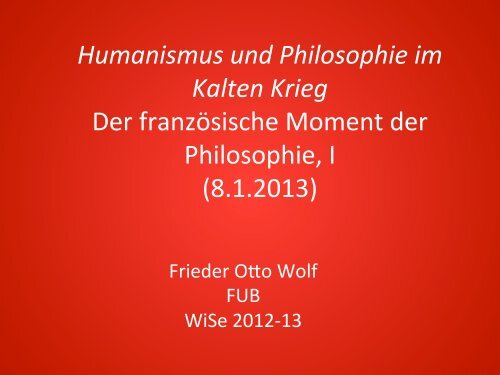
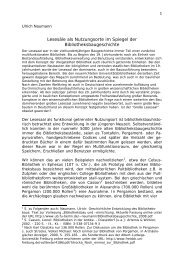
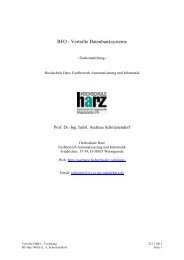
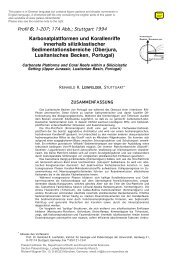

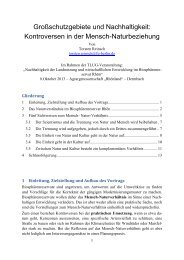
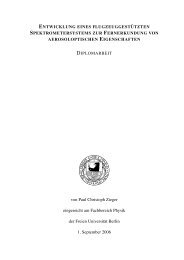

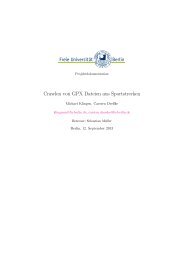
![[UNBEGRENZTE MÖGLICHKEITEN?] - Userpage](https://img.yumpu.com/22343335/1/184x260/unbegrenzte-moglichkeiten-userpage.jpg?quality=85)
